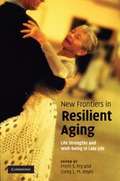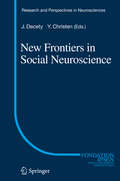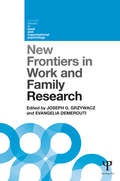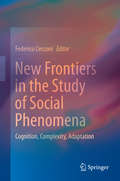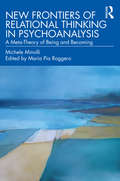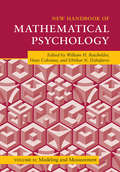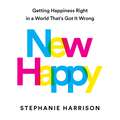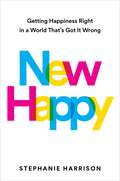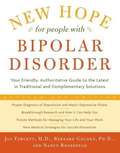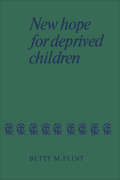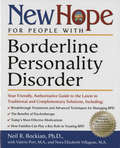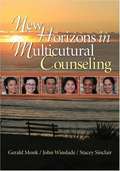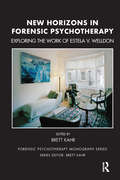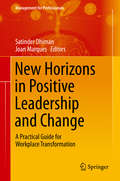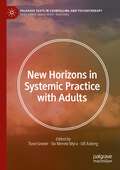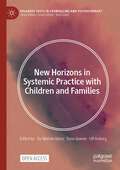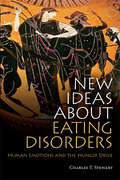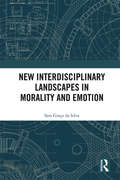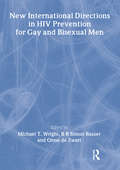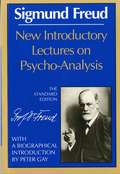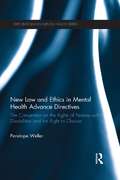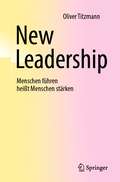- Table View
- List View
New Frontiers in Resilient Aging
by Prem S. Fry Corey L. M. KeyesA typically pessimistic view of aging is that it leads to a steady decline in physical and mental abilities. In this volume leading gerontologists and geriatric researchers explore the immense potential of older adults to overcome the challenges of old age and pursue active lives with renewed vitality. The contributors believe that resilience capacities diminishing with old age is a misconception and argue that individuals may successfully capitalize on their existing resources, skills and cognitive processes in order to achieve new learning, continuing growth, and enhanced life-satisfaction. By identifying useful psychological resources such as social connectedness, personal engagement and commitment, openness to new experiences, social support and sustained cognitive activity, the authors present a balanced picture of resilient aging. Older adults, while coping with adversity and losses, can be helped to maintain a complementary focus on psychological strengths, positive emotions, and regenerative capacities to achieve continued growth and healthy longevity.
New Frontiers in Social Neuroscience
by Jean Decety Yves ChristenTraditionally, neuroscience has considered the nervous system as an isolated entity and largely ignored influences of the social environments in which humans and many animal species live. However, there is mounting evidence that the social environment affects behavior across species, from microbes to humans. This volume brings together scholars who work with animal and human models of social behavior to discuss the challenges and opportunities in this interdisciplinary academic field.
New Frontiers in Work and Family Research
by Joseph G. Grzywacz and Evangelia DemeroutiThe purpose of this volume is to showcase alternative theoretical and methodological approaches to work and family research, and present methodological alternatives to the widely known shortcomings of current research on work and the family. In the first part of the book contributors consider various theoretical perspectives including: Positive Organizational Psychology System Theory Multi-Level Theoretical Models Dyadic Study Designs The chapters in Part Two consider a number of methodological issues including: key issues pertaining to sampling, the role of diary studies, Case Cross-over designs, Biomarkers, and Cross-Domain and Within-Domain Relations. Contributors also elaborate the conceptual and logistical issues involved in incorporating novel measurement approaches. The book will be of essential reading for researchers and students in work and organizational psychology, and related disciplines.
New Frontiers in the Study of Social Phenomena
by Federico CecconiThis book studies social phenomena in a new way, by making judicious use of computer technology. The book addresses the entire spectrum of classic studies in social science, from experiments to the computational models, with a multidisciplinary approach. The book is suitable for those who want to get a picture of what it means to do social research today, and also to get an indication of the major open issues. The book is connected to a database of code for simulations, experimental data and allows to activate a subscription to a teaching tool using NetLogo, a programming language widely used in the social studies. The authors are researchers with first-hand experience research projects, both basic and applied. The work will be useful for those who want to understand more of the social, economic and political phenomena via computer applications.
New Frontiers of Relational Thinking in Psychoanalysis: A Meta-Theory of Being and Becoming
by Michele MinolliNew Frontiers of Relational Thinking in Psychoanalysis aims to take the reader into the depths of their humanity, to promote a creative process that the author calls 'consistency'. Consistency is a quality that enables human subjects to make themselves the starting point of their life, whatever this may be. This book offers a thorough exploration of the place of relational thinking in contemporary psychoanalytic theory and practice. Starting with an analysis of the social and cultural context in which psychoanalysis is currently operating, and of the fragility of the human subject, the author continues by examining the essential assumptions, theoretical strands and key concepts, such as 'consciousness of consciousness', and the I subject, which helps underpin psychoanalysis. New Frontiers of Relational Thinking in Psychoanalysis develops theoretical and clinical ideas through a review of classic references, in light of new scientific and sociological perspectives, to explore and promote the progress of human beings towards their 'consistency'. This book will be of great interest to anyone wanting to understand the place of relational thinking in psychoanalysis now, and how it is likely to develop in the near future, attentive to the challenges of society. It will also be of great value to psychoanalysts, psychologists and other mental health professionals, both in practice and in training.
New Generation Communication: Die Kommunikation in einer veränderten Welt (Europäische Kulturen in der Wirtschaftskommunikation #37)
by Vidya Allemann-RaviCommunication of the new generation is upon us. It was not long ago that the idea of remote working or of machine learning seemed like futuristic endeavors. Yet now, the prospect of using various communication technologies to work for us has never been more feasible. We are navigating connected ecosystems and using data technologies and algorithms to keep pace with an ever-shifting business world. This volume focuses on the impact of communication in a changing world on society and business cultures. The issues that are raised by the authors of this volume range from exploring how language and technology interact in the workplace environment to considering the use of generative technologies and artificial intelligence in marketing and advertising. While the authors showcase a diversity of disciplinary and methodological approaches, they are united in their underlying belief that communication in a changing world is, by and large, a facilitator of dialogue, and is powered by interactions and expansive, cross-disciplinary conversations.
New Handbook of Mathematical Psychology: Volume 2, Modeling and Measurement (Cambridge Handbooks in Psychology)
by Professor William H. Batchelder Professor Hans Colonius Professor Ehtibar N. DzhafarovThe field of mathematical psychology began in the 1950s and includes both psychological theorizing, in which mathematics plays a key role, and applied mathematics motivated by substantive problems in psychology. Central to its success was the publication of the first Handbook of Mathematical Psychology in the 1960s. The psychological sciences have since expanded to include new areas of research, and significant advances have been made in both traditional psychological domains and in the applications of the computational sciences to psychology. Upholding the rigor of the original Handbook, the New Handbook of Mathematical Psychology reflects the current state of the field by exploring the mathematical and computational foundations of new developments over the last half-century. The second volume focuses on areas of mathematics that are used in constructing models of cognitive phenomena and decision making, and on the role of measurement in psychology.
New Happy: Getting Happiness Right in a World That's Got It Wrong
by Stephanie HarrisonWe all want to be happy. This goal drives everything that we do. Why, then, are so many of us so unhappy? It's not your fault. You have been told a lie: that achieving your own success will make you happy. This is "old happy," society's incorrect definition of happiness.The truth is that happiness comes from helping other people to live happier lives. Accompanied by revelatory artwork that explains key concepts, New Happy takes you through the process of unwinding Old Happy, uncovering your own gifts, and using them to both improve your life and the world at the same time. If you have ever asked yourself, "Who am I really?" "When will I be happy?" or "What am I supposed to do with my life?" this book is for you.Through an inspiring blend of art and science, New Happy will forever change the way that you see yourself and the world. Whether you're wondering what career you should choose, navigating a life transition, going through a difficult time, teaching your kids what matters most, or simply hoping to experience more joy every day, New Happy offers the proven path to a happier life and a better world.
New Happy: Getting Happiness Right in a World That's Got It Wrong
by Stephanie HarrisonWe all want to be happy. This goal drives everything that we do. Why, then, are so many of us so unhappy? It's not your fault. You have been told a lie: that achieving your own success will make you happy. This is "old happy," society's incorrect definition of happiness.The truth is that happiness comes from helping other people to live happier lives. Accompanied by revelatory artwork that explains key concepts, New Happy takes you through the process of unwinding Old Happy, uncovering your own gifts, and using them to both improve your life and the world at the same time. If you have ever asked yourself, "Who am I really?" "When will I be happy?" or "What am I supposed to do with my life?" this book is for you.Through an inspiring blend of art and science, New Happy will forever change the way that you see yourself and the world. Whether you're wondering what career you should choose, navigating a life transition, going through a difficult time, teaching your kids what matters most, or simply hoping to experience more joy every day, New Happy offers the proven path to a happier life and a better world.
New Hope For People With Bipolar Disorder Revised 2nd Edition
by Jan Fawcett Bernard Golden Nancy RosenfeldThe second edition of this groundbreaking guidebook provides up-to-date treatments and compassionate guidance for anyone affected by bipolar disorder--from the recently diagnosed to chronic sufferers and their families. You'll receive tips from world-renowned experts--including coauthor Nancy Rosenfeld, herself a bipolar survivor--and learn about vital new options and innovations in bipolar treatment and research, such as:*New precautions: why some patients can get worse rather than better when taking antidepressant medication*The inside story on atypical antipsychotic medications, antidepressants, and other medications that affect neurotransmitters*New genetic research, studies on serotonin, studies into childhood and adolescent bipolar disorder, and results of neuron imaging and neuropsychological testing*Advice on making instant, effective lifestyle changes, coping with stigma, and deciding whether or not--and how--to disclose your illness to others.*A guide to the many evolving forms of psychotherapyFrom the Trade Paperback edition.
New Hope for Deprived Children
by Betty FlintNew Hope for Deprived Children is the carefully documented story of the development of a group of children from infancy through early adolescence. Exhibiting the effects of severe institutional deprivation in the early part of their lives, these children became the focus of a therapeutic programme within an institution designed to relieve their serious developmental deficiencies. The programme and its effects confirmed the faith of the researchers involved that recovery to a certain degree was possible, even with an institutional setting. Further recovery was effected by later placement in foster and adoptive homes. The lives of twenty-eight of these children have been recorded and the data analysed. This book presents their stories in both human and scientific terms. The guidance procedures and therapeutic intervention were based on a personality theory of 'security,' which allowed the research and guidance team to provide a consistent frame of reference to all procedures designed to move the children increasingly closer to 'normal' behaviour. The range of adaptation to homes and community reflects the individual capacities of each child and the capacities of each family to sponsor such individuality. Both the group analysis and the individual histories provide fascinating information and, additionally, pose many fundamental questions about human development.
New Hope for People with Bipolar Disorder: Your Friendly, Authoritative Guide to the Latest in Traditional and Complementary Solutions
by Jan Fawcett Bernard Golden Nancy RosenfeldThe second edition of this groundbreaking guidebook provides up-to-date treatments and compassionate guidance for anyone affected by bipolar disorder—from the recently diagnosed to chronic sufferers and their families. You’ll receive tips from world-renowned experts—including coauthor Nancy Rosenfeld, herself a bipolar survivor—and learn about vital new options and innovations in bipolar treatment and research, such as: •New precautions: why some patients can get worse rather than better when taking antidepressant medication •The inside story on atypical antipsychotic medications, antidepressants, and other medications that affect neurotransmitters •New genetic research, studies on serotonin, studies into childhood and adolescent bipolar disorder, and results of neuron imaging and neuropsychological testing •Advice on making instant, effective lifestyle changes, coping with stigma, and deciding whether or not—and how—to disclose your illness to others. •A guide to the many evolving forms of psychotherapy
New Hope for People with Borderline Personality Disorder: Your Friendly, Authoritative Guide to the Latest in Traditional and Complementar y Solutions (New Hope)
by Neil R. Bockian Nora Elizabeth VillagranDiscover Exciting New Treatments for Borderline Personality DisorderNow you can overcome the symptoms of borderline personality disorder (BPD) and develop a more positive outlook on life, starting today. Inside is a compassionate and complete look at the most up-to-date information on managing the symptoms of BPD as well as coping strategies for you, your friends, and your loved ones. This thoughtful book will teach you how to manage your moods, develop lasting and meaningful relationships, and create a fulfilling, happier state of mind. Your new world of hope starts now as you uncover: ·Effective methods for building self-esteem and minimizing negative thoughts ·Early intervention for children with BPD symptoms ·Information on how psychotherapy can help modify and enhance coping abilities ·Cutting-edge alternative and complementary therapies ·And much more!From the Trade Paperback edition.
New Horizons In Multicultural Counseling
by Gerald Monk John Winslade Stacey SinclairOffering a fresh theoretical perspective and packed with powerful strategies, New Horizons in Multicultural Counseling clarifies the complexity of culture in our increasingly globalized society. Counselors will find practice-based strategies to help them progress in their clinical practice and gain cultural competence.
New Horizons in Forensic Psychotherapy: Exploring the Work of Estela V. Welldon (The Forensic Psychotherapy Monograph Series)
by Brett KahrNew Horizons in Forensic Psychotherapy: Exploring the Work of Estela V. Welldon, edited by the author, contains many rich contributions by some of Welldon's most distinguished former students and proteges. The book consists of important chapters on the creative ways in which colleagues have utilised and expanded upon Welldon's work in the field of forensic psychotherapy in a variety of settings, including in hospitals, prisons, community mental health clinics, and, also, in private practice.
New Horizons in Positive Leadership and Change: A Practical Guide for Workplace Transformation (Management for Professionals)
by Satinder Dhiman Joan MarquesThis edited volume provides managers, as well as students, with the best practices in effectively leading the 21st century workforce and managing change. It applies positive principles arising from the newly emerging fields of positive psychology, positive change, and positive organizational studies to the field of leadership and change; offering managers strategies and tools to lead change effectively, in the present-day boundary-less work environment. At its most fundamental level, the uniqueness of this volume lies in its anchorage in the moral and spiritual dimension of leadership, an approach most relevant for contemporary organizations.
New Horizons in Systemic Practice with Adults (Palgrave Texts in Counselling and Psychotherapy)
by Tone Grover Siv Merete Myra Ulf AxbergThis book explores the various applications of systemic understanding in practice. Each chapter covers diverse working contexts and existential life dilemmas, tackling subjects such as: systemic work with individuals, single session family therapy, experiences of adult longing, the therapeutic relationship as a form of love, working systemically with experiences of marginalisation, cultural difference and diversity, the integration of recent neuroscience developments with systemic therapy with couples, the role of forgiveness and the spiritual dimension in therapy. Throughout, this book promotes hope by presenting new horizons and providing room for reflection on uncertainty, change, opportunities, inter-connections and differences. Theoretical expansion of these existential issues lies both at the heart of systemic work and on the leading edge of research and theory-practice linking, showing how the integration of research with new developments across the broader fields of psychotherapy and counselling can be held within a systemic relational umbrella.
New Horizons in Systemic Practice with Children and Families (Palgrave Texts in Counselling and Psychotherapy)
by Siv Merete Myra Ulf Axberg Tone GrøverThis open access book illustrates how systemic theory, as both a meta-theory and a relational organic theory, can be a suitable framework for understanding and appreciating the new horizons of systemic practice with children and families in their various contexts. The different chapters shed light on how systemic perspectives, as they are presented in their varying contexts, promote hope by giving room for reflections on uncertainty, change, opportunities, interconnections, and differences. The authors describe and reflect on how systemic approaches can be useful for practitioners and make space for a multiplicity of different perspectives that address the needs of children and those assisting them in their various settings, where children grow and develop in the context of their unique needs and challenges. It covers safeguarding children’s rights through parental separation and divorce; families experiencing anticipatory grief; parents struggling with substance use problems; gender incongruence; eating disorders; systemic perspectives on psychiatric diagnosis; children with disabilities; and systemic practice in school. The book will be a source of inspiration, as the purpose is to illustrate the systemic field in constant motion, which encourages, maybe even requires a plurality of theories, perspectives and approaches. But, most importantly, it demonstrates how working with children and families is a privilege.
New Ideas about Eating Disorders: Human Emotions and the Hunger Drive
by Charles T. StewartIn this book, Charles Stewart discusses how the positive affects of the life instinct such as interest and joy, and the crisis affects such as fear, anguish, rage, shame and contempt, condition and can even dissociate the hunger drive, thereby contributing to either positive or negative attitudes toward eating. New Ideas About Eating Disorders presents clinical case studies of individuals from infancy to adulthood suffering from various eating disorders, a new theory as to their etiology, and suggestions for treatment and prevention. This book will be essential reading for all professionals engaged in caring for patients experiencing an eating disorder and for those developing theories to deepen our knowledge of these disturbances. It will also be of interest to those in the field of analytical psychology, as well as anyone wanting to know how contemporary affect theory can help us understand eating and its disorders.
New Interdisciplinary Landscapes in Morality and Emotion
by Sara Graça Da SilvaThe intersection between morality and emotion is not always easily discernible. Researchers often choose to treat these concepts separately, and in doing so an important aspect of this symbiosis is irremediably thwarted. New Interdisciplinary Landscapes in Morality and Emotion considers the relationship between these fields, reflecting on complex philosophical, psychological, social, evolutionary, historical and literary approaches. <P><P>The book reviews emerging paths and features contributions from distinct scientific fields including highly debated and somewhat controversial topics such as the relationship between empathy and in-group biases; emotion and irrationality; reflexivity and meta-emotions; shame and pro-social behaviour; the evolution of human jealousy; the role of love in driving moral motivation; individuals’ wellbeing; behavioural economics; social robotics; historical considerations of medical societies and politics of sadism; and literary reflections on sympathy and emigration. <P><P>Covering various methodological angles and entanglements, New Interdisciplinary Landscapes in Morality and Emotion will appeal to anyone interested in multidisciplinary dialogues from across the humanities, sciences, and the social sciences.
New International Directions in HIV Prevention for Gay and Bisexual Men
by Michael Wright B R RosserIt is widely recognized that current HIV intervention models are falling short of their goals. What are the alternatives?To answer this question, New International Directions in HIV Prevention for Gay and Bisexual Men presents a collection of articles from European and American authors that rival dominant paradigms of HIV prevention. Researchers, practitioners, and community organizations will be challenged to examine current assumptions and to consider neglected aspects of risk behavior such as love, trust, and the dynamics of sexual intimacy. New International Directions in HIV Prevention for Gay and Bisexual Men explores models and theories that will help you develop more effective HIV prevention programs to better serve patients and clients.New International Directions in HIV Prevention for Gay and Bisexual Men offers you fresh perspectives on prevention work by examining risk behaviors in the interactional, communal, and social contexts in which they are practiced. You will receive alternative explanations and reasons for HIV risk that go beyond current approaches and that introduce possibilities for new intervention strategies. Written by experts in the field, the chapters in New International Directions in HIV Prevention for Gay and Bisexual Men will give you insight into new ideas and developments, including: placing a greater emphasis on improving successful risk management strategies as opposed to quantifying risk factors examining the meaning and context of sexual acts which occur in casual encounters or steady partnerships and incorporating their relevancy into prevention work considering the effects that cultural context and socially constructed meanings have on prevention work and incorporating individuals’values and feelings into prevention strategies focusing on more realistic goals of harm reduction that take sexual decision making into consideration as opposed to expecting abstinence relating the various aspects of sexual encounters--physical attraction, intimacy, reciprocity, and power--to reasons why men choose not to use condomsExamining how gay men can underestimate the risk of HIV in order to meet needs of intimacy, New International Directions in HIV Prevention for Gay and Bisexual Men will help you understand the symbolic dimension of sexual contact. The normal, everyday reasons for having sex without a condom are explored, questioning models which often characterize unprotected sex as being the result of low self-esteem, substance abuse, or some other psychological vulnerability. Presenting data from both qualitative and quantitative research conducted at group and individual levels, this book reveals the complexity of risk behavior, the richness of sexual experience, and the importance of respecting the unique context in which gay men live their sexual lives. New International Directions in HIV Prevention for Gay and Bisexual Men will help you understand this point of view, enabling you to provide patients and clients with more effective HIV prevention and risk management services.
New Introductory Lectures on Psycho-Analysis
by Sigmund Freud James StracheyFreud's New Introductory Lectures on Psycho-Analysis takes full account of his elaborations in, and changes of mind about, psychoanalytic theory, and discusses a variety of controversial themes, including anxiety, the drives, and female sexuality.
New Law and Ethics in Mental Health Advance Directives: The Convention on the Rights of Persons with Disabilities and the Right to Choose (Explorations in Mental Health)
by Penelope WellerThe recognition of positive rights and the growing impact of human rights principles has recently orchestrated a number of reforms in mental health law, bringing increasing entitlement to an array of health services. In this book, Penelope Weller considers the relationship between human rights and mental health law, and the changing attitudes which have led to the recognition of a right to demand treatment internationally. Weller discusses the ability of those with mental health problems to use advance directives to make a choice about what treatment they receive in the future, should they still be unable to decide for themselves. Focusing on new perspectives offered by the Conventions on the Rights of Persons with Disabilities (CRPD), Weller explores mental health law from a variety of international perspectives including: Canada, Australia, New Zealand and the United Kingdom, where policies differ depending on whether you are in England and Wales, or Scotland. These case studies indicate how human rights perspectives are shifting mental health law from a constricted focus upon treatment refusal, towards a recognition of positive rights. The book covers topics including: refusing treatment new approaches in human rights international perspectives in mental health law the right to demand treatment. The text will appeal to legal and mental health professionals as well as academics studying mental health law, and policy makers.
New Leadership: Menschen führen heißt Menschen stärken
by Oliver TitzmannNew Leadership – muss das wirklich sein? Ist New Work nicht genug? Oliver Titzmann zeigt auf, warum die agile und digitale Arbeitswelt eine neue Art der Mitarbeiterführung braucht: von der Reflexion des eigenen Leadership Mindsets über die Möglichkeiten, eigene Muster zu durchbrechen, bis hin zu konkreten Ideen für ein wirksames Führen in New Work. Dass dabei längst nicht alles „New“ sein muss, wird Sie womöglich überraschen, Sie aber auch davon überzeugen, dass New Leadership nicht ein weiterer Trend, sondern eine großartige Möglichkeit ist, die komplexen Herausforderungen in unseren Organisationen zu bewältigen. Zum Inhalt In diesem Buch finden Sie für eine moderne Führungsarbeit: eine Praxis orientierte Hinführung zu New Leadership Antworten auf alltägliche Führungsherausforderungen in einer modernen Arbeitswelt und VUCA zielgerichtete Impulse für die Weiterentwicklung des persönlichen Führungsverhaltens Die Zielgruppen Führungskräfte, Startup-Gründer und Geschäftsführer Der Autor Oliver Titzmann arbeitet als Berater, Dozent und Coach mit Führungskräften im internationalen Umfeld. Er leitet das Center of Change Management im Management Institute St. Gallen (SGMI), wo er ebenfalls eine Lehrtätigkeit ausübt. Außerdem ist er Startup Gründer und Investor. Zitate „Oliver Titzmann steht für Leidenschaft, Wertschätzung, Lebensfreude, Qualität und Humor. Und genau diese Attribute findet man in seiner Haltung zu guter Führung und in diesem Buch.“ David Schülke, Director HR Engelbert Strauss GmbH & Co. KG „Dieses Buch ist ein Muss für jeden der sich für die Arbeit mit Hochleistungsteams inspirieren lassen möchte!“ Dr. Damaris Essing, Teamärztin der dt. Rollstuhl-Basketball Nationalmannschaft der Frauen „Great leaders create an environment where people can harness their individual talents and thrive. Oliver’s ideas point to the future of leadership.“ Trang Le, founder and Chairwoman of the Vietnam International Fashion Week & President of the Council of ASEAN
New Media and Perennial Problems in Foreign Language Learning and Teaching
by Liliana Piasecka Małgorzata Adams-Tukiendorf Przemysław WilkThe book concerns the ways in which the new media shape communication along with educational expectations and practices in foreign language classrooms. Although foreign language learners have cheap and easy access to information and ways of communication, they also wrestle with problems that have always accompanied language learning. The focus of the book is two-fold. On the one hand, the authors demonstrate how using social networks, videoconferencing, mobile phones, wikis, and computer-mediated interaction contributes to the development of language skills, negotiated interaction, autonomy, and intercultural competence. On the other, they discuss "old" issues pertaining to the role of vocabulary, corrective feedback, textbooks and inner speech in the process of language learning and use. Every chapter reports original empirical research on issues related to the new media and old problems in foreign language teaching contexts in various countries, and with respect to various age groups.
